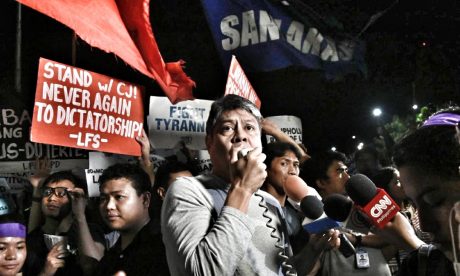
It is easy to see the superficial problem with the Philippine Opposition — its inability to unite. Such an ability is important today, because they are up against a popular incumbent. But it is also easy to see how the problem with the Opposition is deeper than an inability to unite by simply asking another question: Why is the Opposition unable to unite?
The reason the Opposition is unable to unite is because they are backward- rather than forward-looking. They expect to find “unity” in a historical common fear of a “return to dictatorship”. However, they had based that historical notion on a 30-year narrative propagated by a single feudal clan to further a political agenda. Indeed, over those several decades, that feudal clan — the Aquino-Cojuangco clan — had turned that narrative into a vast mythology (complete with gods, demons, and symbols) that imprisoned Filipinos’ minds, subliminally keeping the people distracted from and oblivious to the power brokering they sneakily did behind the scenes.
To this day, it is still this mythology they draw upon as input into their obsolete messaging. In the recent case of the Supreme Court (SC) ruling that voided Lourdes Sereno’s appointment as Chief Justice back in 2012, the Opposition led by the Liberal Party (a.k.a. the Yellowtards) have chosen to go down the path of discrediting the Supreme Court and dismissing it as just the most recent of government institutions that Philippine President Rodrigo Duterte now “controls”. Predictably true to form, they have spun this outcome as further “evidence” of an emerging “dictatorship” being perpetrated by Duterte.
In so doing, however, the Yellowtards had essentially burnt the bridge they may very well need to backpedal over to explore other options to get around the setback of Sereno’s removal from the SC. After all, the Supreme Court remains fully-functional and fully on top of the Philippines’ judicial branch. The playing field of the entire law profession is governed by the country’s court system over which the Supreme Court presides. There is no getting around the SC. It is still there. Even during “revolutionary” situations, newly-crowned “revolutionary” presidents legitimised their rule through a swearing in ritual officiated by either the Chief Justice of the Supreme Court or a duly-appointed representative.
In that context it is bizarre the way the Opposition resorts to spectacles today involving the conspicuous presence of Roman Catholic priests and nuns or the clerics of one religious organisation or the other. It is as if these Yellowtards are saying that they are deferring to the “higher power” of the Almighty to validate their politics. Yet when it comes down to legitimising a new president — even a “revolutionary” one — they will find that all roads to legitimacy still lead to the Supreme Court. Indeed, imagine the alternative — a president sworn in by a Catholic bishop or cardinal. It’s an ironic scenario that flies over the pointed heads of the religious nuts of Yellowtardom! They are essentially advocating a return to the days when monarchs were given heavenly mandates to effect absolute rule on their subjects by God’s earthly vassals in robes.
Small surprise, therefore, that the Opposition remain hopelessly-fragmented. By their own doing, they’ve divided themselves along religious lines, lines delineating a variety of interpretations of the law, differences in interpretation of history, of definitions of “fake news”, of who owns the sacred notion of “people power”, and, most bizarre of all, of who holds final authority over the interpretation of the law. And yet, it has long been obvious that Filipinos, like any other freedom-loving people, have so much more in common than all that pettiness. It only takes a simple change in perspective to see that common vision. It only takes a focus on the future and on the prospective and a collective letting go of the past and the retrospective thinking fixation on it induces in the collective mind of the Filipino people.
Duterte won an election in 2016 by focusing his constituents on what is possible and has attracted admiration in the lack of deference to the historical baggage of tradition he had exhibited during his campaign and well into his presidency. The Yellowtards, however, had, since Day One, chosen to stubbornly stick to its beholdenness to that very tradition and past baggage that Duterte had turned his and Filipinos’ backs on. What the Yellowtards and the Opposition they presume to lead need to do is learn how to battle an innovative foe. They cannot do that by doing the very same things that had led to their fall to begin with and they cannot expect to win using the very same thinking that contributes to sustaining the losing strategy they remain stuck with.

No comments:
Post a Comment